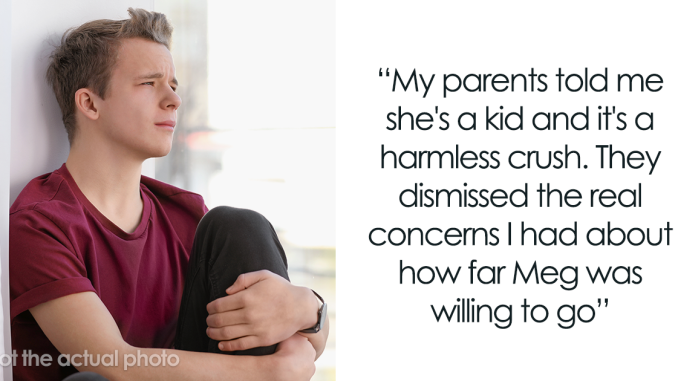
Invalidating a child’s feelings is one of the worst things any parent can do. These actions are not only hurtful as they happen, but the pain from such psychological abuse may linger for a long time.
This was the experience of a teenage boy who dealt with the untoward advances of his sister’s best friend. Instead of helping him ward her off, his parents downplayed the situation as a “harmless crush.”
The situation forced him to move out and run off to his grandparents, but his actions only caused more tension within the family.
A teenage boy had been dealing with untoward advances from his sister’s best friend
Image credits: New Africa / Freepik (not the actual photo)
Despite how she made him uncomfortable, his parents dismissed it as a “harmless crush”
Image credits: Image by Freepik (not the actual photo)
The situation got so out of hand that he was forced to leave home and move in with his grandparents
Image credits: vgstockstudio / Freepik (not the actual photo)
However, his actions only caused more division within their family
Image credits: FabulousHand3789
The effects of parental gaslighting can carry over into adulthood
At 17, the boy had already experienced repeated gaslighting from his parents. According to author and counsellor Dominic Decker, it can happen in various forms, including blame shifting, dismissal of emotions, invalidation, and trivializing, all of which the parents did.
Parental gaslighting is a form of psychological abuse that may linger for a long time. In this case, the story’s author may experience it through his adult years.
As clinical psychologist Dr. Daniel S. Lobel explains in an article for Psychology Today, the abused child may find it difficult to trust themselves, their memories, and their perception of reality.
According to Dr. Lobel, these individuals tend to grow up with insecurities about their abilities.
“They suffer considerable anxiety and often underachieve, as they underestimate their abilities and lack confidence,” he wrote, adding that the person may struggle with decision-making or taking on leadership roles.
Dr. Lobel says parents suffering from mental disorders like borderline and narcissistic personalities are more likely to gaslight their children because they “loathe to take responsibility for errors or unwanted consequences.”
Self-compassion can help curb the effects of parental gaslighting
A person carrying trauma from parental gaslighting may feel dejected and hopeless and think, “the damage has been done.” However, experts encourage practicing self-compassion and acceptance.
Dr. Lobel says the first step is understanding that gaslighting could have been the parents’ coping mechanism, emphasizing that “you are not actually incompetent.” Step two is about taking risks and trusting your abilities rather than seeking validation from others.
“Though painful, this process can change your life by giving you a level of peace of mind that you never dreamed you could attain,” Dr. Lobel stated.
Decker adds that establishing emotional distance is also essential when dealing with toxic behavior from a parent. He emphasizes the importance of refusing to be consumed by the negativity and instead acknowledging its impact and your desire to overturn it.
The author did the right thing by running off to his grandparents, who are influential enough to deal with his mother and father. At his age, he had enough self-awareness to see how unhealthy his home environment was.
